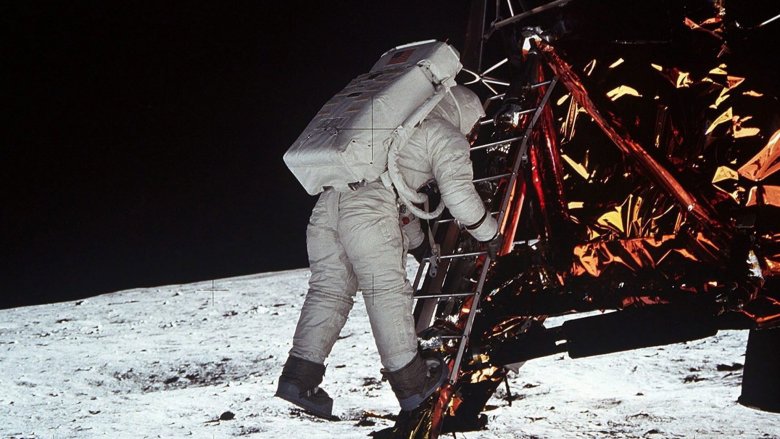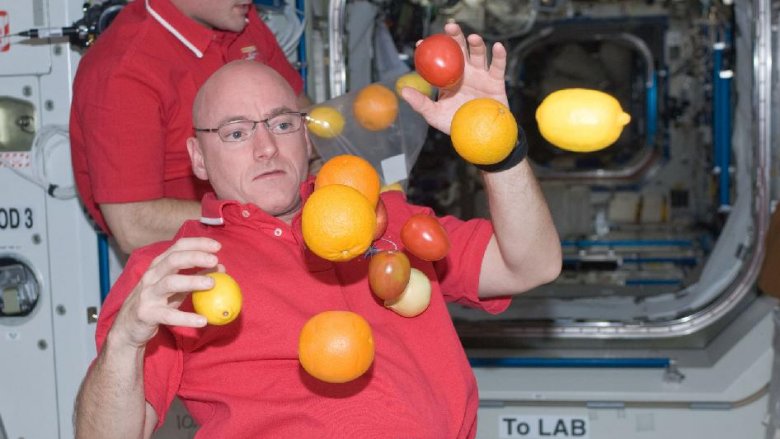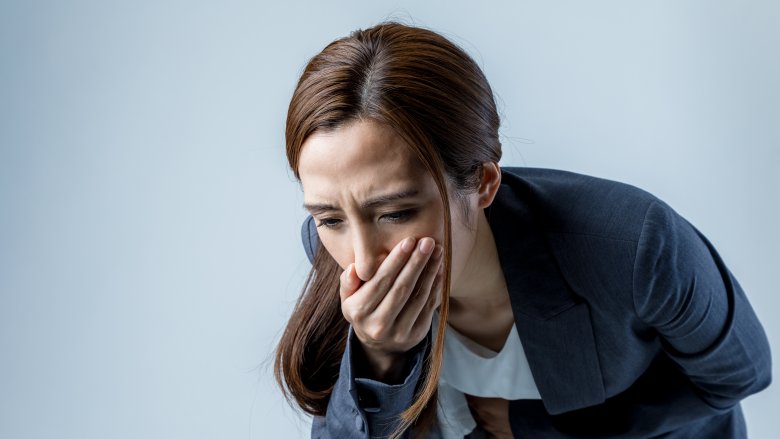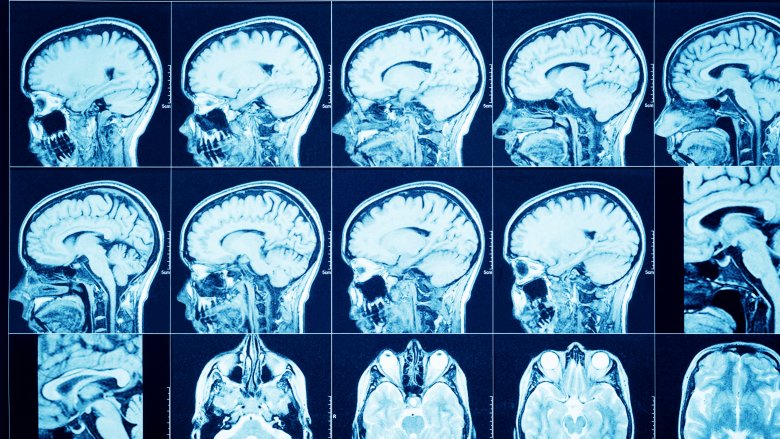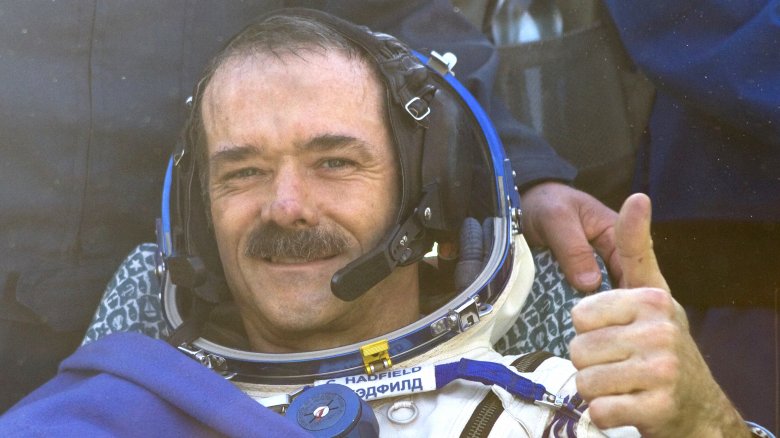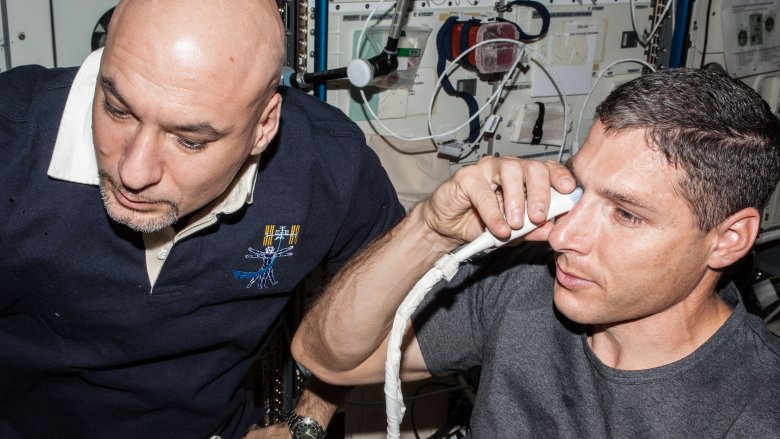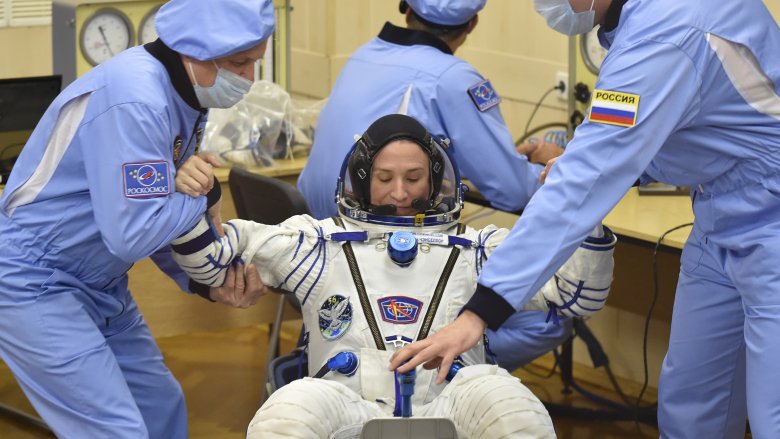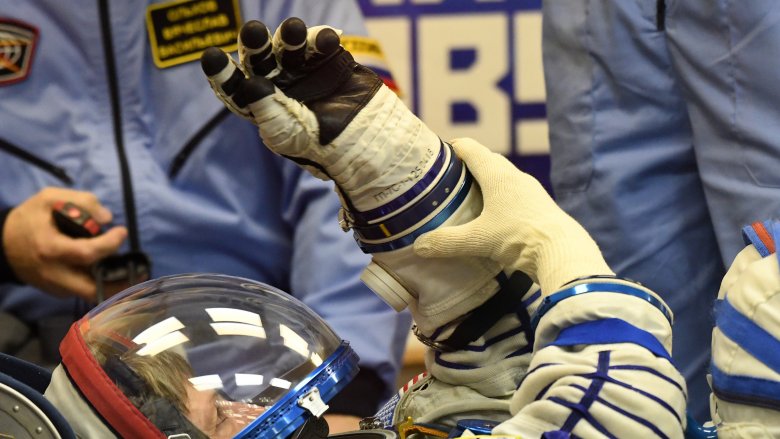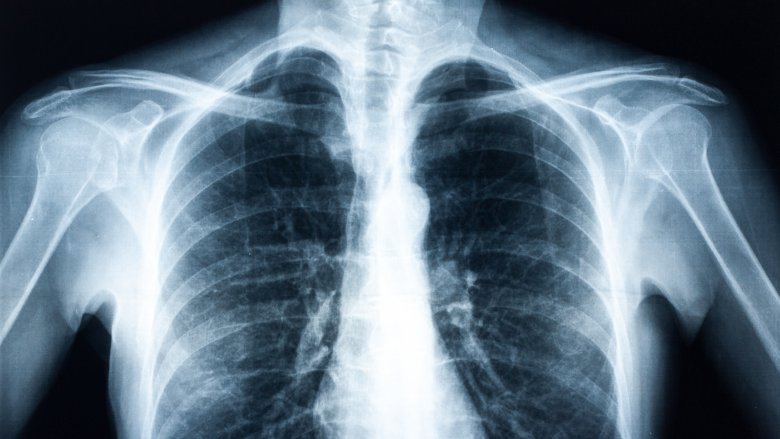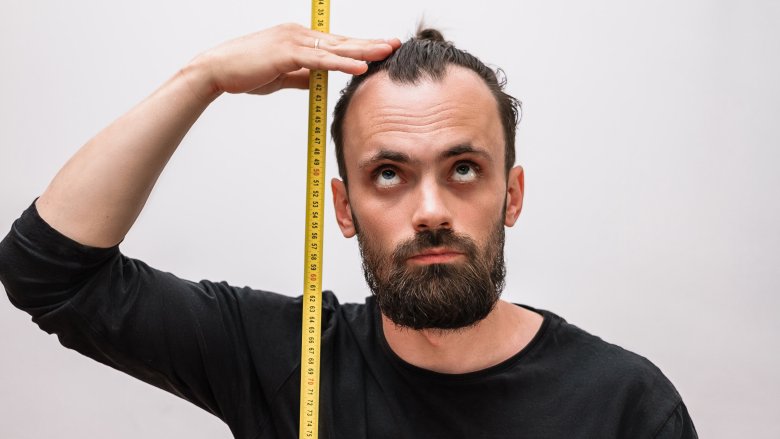Fascinating Things That Space Does To The Human Body
Space. The final frontier. The only place on Earth that's not on Earth. Whether or not most of us ever get there (we won't), space is a pretty cool place that we've had access to for decades and still have barely explored at all. There's just so much we don't know about what's out there yet and a lot of that is due to the limitations of time, money, technology, and, yes, the human body.
When you're in space, beyond the atmosphere and gravity of the Earth, nothing works the same. The human body gets put through the ringer and we're discovering new issues all the time as well as new ways to adapt to those issues. The fact is, space is weird. It's super weird, and that means weird and fascinating things happen to you once you get up there. Some of it is kind of cool and fun while some of it is potentially life-threatening. Good thing astronauts and rocket scientists know what they're doing because otherwise the hassle of not just getting to space but staying and enduring the trip would be pretty much impossible. Seriously, just look at some of the bizarre stuff that happens to a human body once it escapes Earth and settles into orbit in the great beyond.
You forget gravity exists
If you've ever hit your shin on a sofa after rearranging your furniture, you'll probably relate to this quirky psychological issue that some astronauts have run into. The human mind gets used to things being a certain way. Much like your shin expected that sofa to be empty air, your brain is used to the idea that if you let go of a cup, it'll fall. The problem is once you get to space, that isn't true. If you let go of your cup, it'll kind of gently bob and float around thanks to the fun way gravity doesn't exist up there.
A lack of gravity probably takes a bit of getting used to, but so does getting used to the presence of it once more. Many astronauts who have been to space for the long haul have reported an issue once they get back to Earth. Air and Space Magazine detailed a story about astronaut Joe Edwards who was undergoing a medical exam after returning from a week in orbit. A medical officer had given him a cup of lemonade and then asked him to remove his shoes, so Edwards simply let go of the cup, causing it to do what all things do when subject to gravity. It fell. Because he forgot gravity was a thing.
Space sickness affects many astronauts
Space sickness sounds like something made up for a mid-1950s sci-fi movie that wasn't big on creativity. But it's the colloquial name for a series of symptoms that are pretty common in astronauts. Without experiencing weightlessness yourself it's hard to fully grasp the sensation, but it's been described as a mix of both motion sickness and disorientation wrapped up in one queasy package.
According to Space.com, space sickness has been a problem from the beginning and it was compounded by the fact that early astronauts didn't want to report symptoms. Being sick could ground you from a mission, after all, and there was a manly factor to the idea of keeping your rolling stomach to yourself.
More than half of astronauts suffer the effects, and it's exacerbated by pretty much any kind of movement, particularly head movements. The full mechanism for why space sickness happens isn't known. Motion sickness is definitely at the core of it — you're always moving in space — but it's compounded by the physiological effects of zero gravity, like fluid building up inside your head because gravity isn't forcing it down. On the upside, it's a short-lived condition and most astronauts adapt within a few days. But it's something to keep in mind if you ever decide to become a space tourist.
Space changes your genes ... a little
In 2018, headlines said that astronaut Scott Kelly's DNA had been altered by 7 percent. He was a space mutant! Except that's not exactly what happened, and exaggerating it diminishes how cool it actually was.
Kelly spent a year on the space station. Part of the reason for this extended mission was to determine how well we can adapt to long-term life in space, which will be important if we ever want to go to Mars. Kelly has an identical twin brother named Mark, making Scott an excellent test subject because you could compare him genetically to his brother and see if anything changed after that year.
What NASA noted was that it seems like Scott's genes had changed somewhat. Vox explains it was not his DNA as was reported, which would literally make him a different kind of life-form, but his genes. Genes govern how your cells operate. They're subject to all kinds of altering, outside influences — that's part of how cancer forms, for instance. Scott's genes were tweaked in ways that related to DNA repair, his immune system, and a few other aspects. NASA also noticed this wasn't a lot different than what you'd expect under the stress of scuba diving or mountain climbing. But it does mean we adapt on a genetic level to space, which is very cool.
Space changes the shape of your brain
When it comes to your brain, most of us don't know a whole lot about how it works. Even scientists aren't 100 percent certain how everything functions up there. But most of us could agree that whatever our brain is doing, we want it to maybe stay the same shape inside our head while it's doing it. Unfortunately, space doesn't care about what we want, which means the shape of your brain can and will change in space.
MRI scans of astronaut brains show a significant change in gray matter volume. Some parts of your brain expand while others contract, potentially related to a redistribution of cerebrospinal fluid in a weightless environment.
Astronauts who spend more time in space show more significant changes in the shapes of their brains. As Space.com explained, there is more noticeable change in the parts of the brain that govern motor function over the lower body and legs, as well as sensory perception from those areas. It's believed this is an indication of the brain actively learning to adapt to movement in zero gravity. It's a significant glimpse at your brain's ability to adapt and learn new skills at a level nearly impossible to mimic on Earth. After all, if you're practicing a new skill on Earth it's limited by how long you can commit to it. In space, you're adapting to zero gravity movement all day every day, whether you like it or not.
You can suffer space euphoria
It's not often you use the word "euphoria" in casual conversation these days. While it can just mean a sense of well-being, we tend to reserve it for something a little more intense than that. You'll often see it used in medical terms relating to the experience of drug use or various symptoms of mental illness. So if you hear someone talking about space euphoria, assume it's a pretty unusual condition.
The website io9 detailed an interesting story of the space walk of astronaut Ed White back in 1965. White was the first American ever to go on a space walk, tethered to his vehicle but mostly just free in the vastness of space. White was the first person to experience space euphoria.
In recordings of the walk, you can hear of the difficulty ground control has getting White to end it. He's giddy and says it's the greatest experience of his life. When they finally do talk him in, he laments it's then the saddest moment of his life. He wanted to stay out there indefinitely. He wasn't the only one.
Chris Hadfield explained the dangers of his space euphoria in 2001. Looking out at the universe, he became overwhelmed and started to cry. Only, in space, tears don't fall. He was in space, holding a drill, and blinded by his own tears. He should have told control what was happening but didn't because the euphoria had compromised his better judgment.
Space can ruin your eyesight
There are a handful of things you hope don't fail you when you go to space. You want to make sure you still have oxygen handy, no holes in the spacecraft, plenty of food and fuel, and all the basics like that. But on a physical level, probably more than anything, you need your eyes to work. Until we advance to the point where people with difficulty seeing can comfortably live and work in space, we need to rely on others with 20/20 vision to get things done. But space isn't on board with that.
Prolonged time in space will damage your eyes — it happens to nearly every astronaut who spends more than six months in orbit. The American Academy of Ophthalmology explains how the human eye actually flattens at the back in space. The retina and optic nerve also suffer some alteration. While these problems can go away, for some astronauts they remain issues for years after their return to Earth.
Twenty-three percent of short-flight astronauts and a remarkable 49 percent of long-flight astronauts reported changes in vision. The fear is that on a multi-year mission to Mars, an astronaut may actually go blind and the damage would be irreparable. As for the cause? Potential pressure changes in the brain and spinal fluid may be it, but NASA isn't fully sure yet.
Your immune system can't handle space
When functioning properly, the human immune system is a pretty impressive thing. Considering all the viruses and bacteria floating around in the world that have the potential to do us harm, your immune system is a workhorse at keeping you healthy. It doesn't always succeed, though, and it looks like we're not doing it any favors when we go to space. For reasons still not fully understood, space runs roughshod over your immune system in some pretty weird ways.
Some of your cell activity gets significantly depressed after time in space, sometimes to the point of reawakening latent viruses like chickenpox, though without the symptoms. It's not unusual for astronauts to suffer rashes and aggressive allergy symptoms as well. The reasons for this are debated, though there are some educated guesses about what's going on. Space.com explains that things like exposure to radiation, extreme stress, microbes, altered sleep, and the effects of zero gravity could all be playing a part in the havoc that your immune system experiences in space. That means this is definitely one of those things that needs to be more thoroughly researched and dealt with before any extended trips to other planets are undertaken, since no one wants an entire crew to Mars sidelined by space pox as soon as they get where they're going.
You risk losing your fingernails in space
If you like horror movies, every so often you'll run across one that includes a scene of someone losing a fingernail. They're clawing at something, or maybe being victimized some way, and the camera lingers on the shot and you can't help but cringe because few things are more offputting to a human than the idea of a fingernail being torn off. It's supremely disturbing, so imagine how awful it would be if it happened in space.
As National Geographic explained, making gloves work in space has long been an issue. They need to insulate while allowing for fine motor function. The result of this has been numerous hand traumas endured by astronauts. In fact, 47 percent of 352 reported issues were hand-related. The problems often stemmed from hard thimbles inside the gloves that would catch on fingertips and, in some cases, cause a fingernail to completely detach from the nail bed.
Of 232 crew members who had injury reports on file, 22 of them reported at least one instance of a nail coming completely off. This is in addition to a host of other hand traumas the gloves can cause that include blistering and infections thanks to the fact they need to be pressurized in order to protect from the temperatures in space. Basically, if you have to wear gloves in space, you're going to have a bad time.
You lose bone density
We've long heard we need to get lots of calcium and vitamin D if we want to have strong bones, and that's pretty sound advice. That said, things are not so cut and dried in space, where astronauts can lose up to 2 percent of their bone density per month, according to the Canadian Space Agency.
The problems with losing bone density can't be understated. The effects on astronauts when they return to earth are pretty severe. Thirteen astronauts who spent six months on the space station suffered a 14 percent loss in bone density on average, according to Space.com. Three of them lost 30 percent which puts them on even footing with an elderly victim of osteoporosis. This also means astronauts are putting themselves at risk of serious breaks and fractures as they age.
Your bones suffer in space because, with no gravity to work against, your body is really facing no resistance whatsoever and nothing keeps it from basically wasting away. Astronauts literally have to work out for hours a day to combat the problem or risk extensive muscle and bone loss. Who knew that even just sitting on a sofa down here in Earth's gravity watching Netflix was actually doing more for your body than hanging out in space?
You grow taller
There's good news if you've ever wished there was a way to grow taller without having to surgically change the length of your shins — space makes you taller! A person who is 6 feet tall can expect to gain about 2 inches in height. Your dreams of being on the Space Jam basketball team may yet be a reality. But there is a downside.
Being in space without the burden of gravity constantly trying to force you to the ground allows your vertebrae to expand. As NASA explains, your spine is like a spring in a lot of ways, it has to be to allow us the range of movement we enjoy without causing us to snap like breadsticks. The spaces between individual vertebrae get a chance to relax and spread apart in space. It's only temporary, however. Once you come back to gravity, your height goes right back to normal.
A fun side effect of the height change is that NASA actually has to account for this in their design plans. Uniforms need to be made loose enough to accomodate a few extra inches of humanity growing into them. The first few astronauts in space must have been a bit uncomfortable before we learned all that.
So many awful things happen if you get exposed to space
So the big question about living in space is about the very literal definition there — how long can you live in space? Not in a space shuttle or on space station, but if you go full Star Lord and expose yourself, unprotected, to the vacuum of space. What happens then? It's not pretty, but also maybe not what you think.
CNET details a veritable horror movie of effects you'd experience if you found yourself in space. You'd use up the oxygen in your blood in a matter of seconds, but it wouldn't kill you immediately. In fact, you could maybe live for a couple minutes — sort of like drowning — and you probably could be revived. Just don't try to hold your breath because in space that would explode your lungs.
You won't blow up as some movies have predicted, but the liquid under your skin will vaporize and cause expansion,which could also be reversed. Your tongue might boil, though, so watch out for that. You'll also be unprotected from the unfiltered radiation of space, and that's going to burn your skin. Basically there's nothing you want to experience in any way out in space. Best to stay indoors and leave that sort of thing to superheroes.
